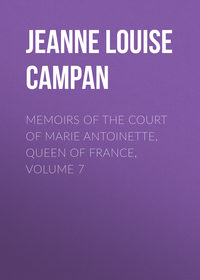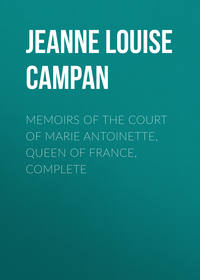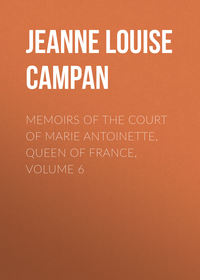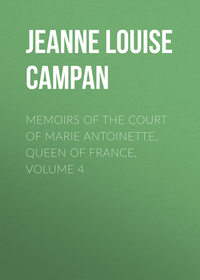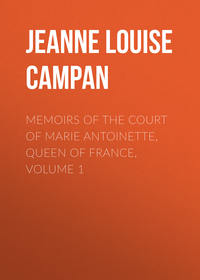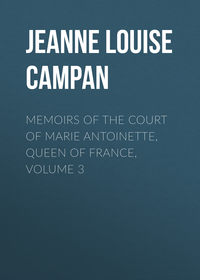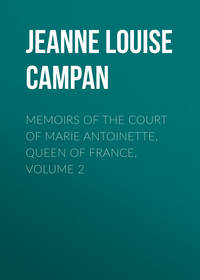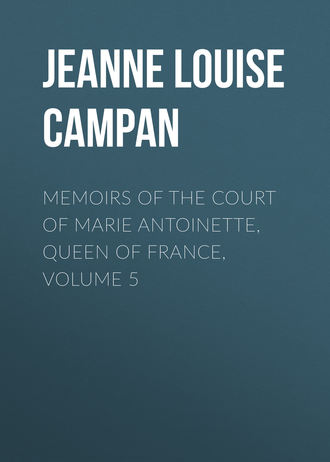 полная версия
полная версияMemoirs of the Court of Marie Antoinette, Queen of France, Volume 5
The progress of the procession was so slow that it was near six in the evening when this august family, made prisoners by their own people, arrived at the Hotel de Ville. Bailly received them there; they were placed upon a throne, just when that of their ancestors had been overthrown. The King spoke in a firm yet gracious manner; he said that he always came with pleasure and confidence among the inhabitants of his good city of Paris. M. Bailly repeated this observation to the representatives of the commune, who came to address the King; but he forgot the word confidence. The Queen instantly and loudly reminded him of the omission. The King and Queen, their children, and Madame Elisabeth, retired to the Tuileries. Nothing was ready for their reception there. All the living-rooms had been long given up to persons belonging to the Court; they hastily quitted them on that day, leaving their furniture, which was purchased by the Court. The Comtesse de la Marck, sister to the Marechaux de Noailles and de Mouchy, had occupied the apartments now appropriated to the Queen. Monsieur and Madame retired to the Luxembourg.
The Queen had sent for me on the morning of the 6th of October, to leave me and my father-in-law in charge of her most valuable property. She took away only her casket of diamonds. Comte Gouvernet de la Tour-du-Pin, to whom the military government of Versailles was entrusted 'pro tempore', came and gave orders to the National Guard, which had taken possession of the apartments, to allow us to remove everything that we should deem necessary for the Queen's accommodation.
I saw her Majesty alone in her private apartments a moment before her departure for Paris; she could hardly speak; tears bedewed her face, to which all the blood in her body seemed to have rushed; she condescended to embrace me, gave her hand to M. Campan to kiss, and said to us, "Come immediately and settle at Paris; I will lodge you at the Tuileries; come, and do not leave me henceforward; faithful servants at moments like these become useful friends; we are lost, dragged away, perhaps to death; when kings become prisoners they are very near it."
I had frequent opportunities during the course of our misfortunes of observing that the people never entirely give their allegiance to factious leaders, but easily escape their control when some cause reminds them of their duty. As soon as the most violent Jacobins had an opportunity of seeing the Queen near at hand, of speaking to her, and of hearing her voice, they became her most zealous partisans; and even when she was in the prison of the Temple several of those who had contributed to place her there perished for having attempted to get her out again.
On the morning of the 7th of October the same women who the day before surrounded the carriage of the august prisoners, riding on cannons and uttering the most abusive language, assembled under the Queen's windows, upon the terrace of the Chateau, and desired to see her. Her Majesty appeared. There are always among mobs of this description orators, that is to say, beings who have more assurance than the rest; a woman of this description told the Queen that she must now remove far from her all such courtiers as ruin kings, and that she must love the inhabitants of her good city. The Queen answered that she had loved them at Versailles, and would likewise love them at Paris. "Yes, yes," said another; "but on the 14th of July you wanted to besiege the city and have it bombarded; and on the 6th of October you wanted to fly to the frontiers." The Queen replied, affably, that they had been told so, and had believed it; that there lay the cause of the unhappiness of the people and of the best of kings. A third addressed a few words to her in German: the Queen told her she did not understand it; that she had become so entirely French as even to have forgotten her mother tongue. This declaration was answered with "Bravo!" and clapping of hands; they then desired her to make a compact with them. "Ah," said she, "how can I make a compact with you, since you have no faith in that which my duty points out to me, and which I ought for my own happiness to respect?" They asked her for the ribbons and flowers out of her hat; her Majesty herself unfastened them and gave them; they were divided among the party, which for above half an hour cried out, without ceasing, "Marie Antoinette for ever! Our good Queen for ever!"
Two days after the King's arrival at Paris, the city and the National Guard sent to request the Queen to appear at the theatre, and prove by her presence and the King's that it was with pleasure they resided in their capital. I introduced the deputation which came to make this request. Her Majesty replied that she should have infinite pleasure in acceding to the invitation of the city of Paris; but that time must be allowed her to soften the recollection of the distressing events which had just occurred, and from which she had suffered too much. She added, that having come into Paris preceded by the heads of the faithful Guards who had perished before the door of their sovereign, she could not think that such an entry into the capital ought to be followed by rejoicings; but that the happiness she had always felt in appearing in the midst of the inhabitants of Paris was not effaced from her memory, and that she should enjoy it again as soon as she found herself able to do so.
Their Majesties found some consolation in their private life: from Madame's—[Madame, here, the Princesse Marie Therese, daughter of Marie Antoinette.]—gentle manners and filial affection, from the accomplishments and vivacity of the little Dauphin, and the attention and tenderness of the pious Princess Elisabeth, they still derived moments of happiness. The young Prince daily gave proofs of sensibility and penetration; he was not yet beyond female care, but a private tutor, the Abbe Davout, gave him all the instruction suitable to his age; his memory was highly cultivated, and he recited verses with much grace and feeling.
[On the 19th of October, that is to say, thirteen days after he had taken up his abode at Paris, the King went, on foot and almost alone, to review some detachments of the National Guard. After the review Louis XVI. met with a child sweeping the street, who asked him for money. The child called the King "M. le Chevalier." His Majesty gave him six francs. The little sweeper, surprised at receiving so large a sum, cried out, "Oh! I have no change; you will give me money another time." A person who accompanied the monarch said to the child, "Keep it all, my friend; the gentleman is not chevalier, he is the eldest of the family."—NOTE BY THE EDITOR.]
The day after the arrival of the Court at Paris, terrified at hearing some noise in the gardens of the Tuileries, the young prince threw himself into the arms of the Queen, crying out, "Grand-Dieu, mamma! will it be yesterday over again?" A few days after this affecting exclamation, he went up to the King, and looked at him with a pensive air. The King asked him what he wanted; he answered, that he had something very serious to say to him. The King having prevailed on him to explain himself, the young Prince asked why his people, who formerly loved him so well, were all at once angry with him; and what he had done to irritate them so much. His father took him upon his knees, and spoke to him nearly as follows: "I wished, child, to render the people still happier than they were; I wanted money to pay the expenses occasioned by wars. I asked my people for money, as my predecessors have always done; magistrates, composing the Parliament, opposed it, and said that my people alone had a right to consent to it. I assembled the principal inhabitants of every town, whether distinguished by birth, fortune, or talents, at Versailles; that is what is called the States General. When they were assembled they required concessions of me which I could not make, either with due respect for myself or with justice to you, who will be my successor; wicked men inducing the people to rise have occasioned the excesses of the last few days; the people must not be blamed for them."
The Queen made the young Prince clearly comprehend that he ought to treat the commanders of battalions, the officers of the National Guard, and all the Parisians who were about him, with affability; the child took great pains to please all those people, and when he had had an opportunity of replying obligingly to the mayor or members of the commune he came and whispered in his mother's ear, "Was that right?"
He requested M. Bailly to show him the shield of Scipio, which is in the royal library; and M. Bailly asking him which he preferred, Scipio or Hannibal, the young Prince replied, without hesitation, that he preferred him who had defended his own country. He gave frequent proofs of ready wit. One day, while the Queen was hearing Madame repeat her exercises in ancient history, the young Princess could not at the moment recollect the name of the Queen of Carthage; the Dauphin was vexed at his sister's want of memory, and though he never spoke to her in the second person singular, he bethought himself of the expedient of saying to her, "But 'dis donc' the name of the Queen, to mamma; 'dis donc' what her name was."
Shortly after the arrival of the King and his family at Paris the Duchesse de Luynes came, in pursuance of the advice of a committee of the Constitutional Assembly, to propose to the Queen a temporary retirement from France, in order to leave the constitution to perfect itself, so that the patriots should not accuse her of influencing the King to oppose it. The Duchess knew how far the schemes of the conspirers extended, and her attachment to the Queen was the principal cause of the advice she gave her. The Queen perfectly comprehended the Duchesse de Luynes's motive; but replied that she would never leave either the King or her son; that if she thought herself alone obnoxious to public hatred she would instantly offer her life as a sacrifice;—but that it was the throne which was aimed at, and that, in abandoning the King, she should be merely committing an act of cowardice, since she saw no other advantage in it than that of saving her own life.
One evening, in the month of November, 1790, I returned home rather late; I there found the Prince de Poix; he told me he came to request me to assist him in regaining his peace of mind; that at the commencement of the sittings of the National Assembly he had suffered himself to be seduced into the hope of a better order of things; that he blushed for his error, and that he abhorred plans which had already produced such fatal results; that he broke with the reformers for the rest of his life; that he had given in his resignation as a deputy of the National Assembly; and, finally, that he was anxious that the Queen should not sleep in ignorance of his sentiments. I undertook his commission, and acquitted myself of it in the best way I could; but I was totally unsuccessful. The Prince de Poix remained at Court; he there suffered many mortifications, never ceasing to serve the King in the most dangerous commissions with that zeal for which his house has always been distinguished.
When the King, the Queen, and the children were suitably established at the Tuileries, as well as Madame Elisabeth and the Princesse de Lamballe, the Queen resumed her usual habits; she employed her mornings in superintending the education of Madame, who received all her lessons in her presence, and she herself began to work large pieces of tapestry. Her mind was too much occupied with passing events and surrounding dangers to admit her of applying herself to reading; the needle was the only employment which could divert her.
[There was long preserved at Paris, in the house of Mademoiselle Dubuquois, a tapestry-worker, a carpet worked by the Queen and Madame Elisabeth for the large room of her Majesty's ground-floor apartments at the Tuileries. The Empress Josephine saw and admired this carpet, and desired it might be taken care of, in the hope of one day sending it to Madame—MADAME CAMPAN.]
She received the Court twice a week before going to mass, and on those days dined in public with the King; she spent the rest of the time with her family and children; she had no concert, and did not go to the play until 1791, after the acceptation of the constitution. The Princesse de Lamballe, however, had some evening parties in her apartments at the Tuileries, which were tolerably brilliant in consequence of the great number of persons who attended them. The Queen was present at a few of these assemblies; but being soon convinced that her present situation forbade her appearing much in public, she remained at home, and conversed as she sat at work. The sole topic of her discourse was, as may well be supposed, the Revolution. She sought to discover the real opinions of the Parisians respecting her, and how she could have so completely lost the affections of the people, and even of many persons in the higher ranks. She well knew that she ought to impute the whole to the spirit of party, to the hatred of the Duc d'Orleans, and the folly of the French, who desired to have a total change in the constitution; but she was not the less desirous of ascertaining the private feelings of all the people in power.
From the very commencement of the Revolution General Luckner indulged in violent sallies against her. Her Majesty, knowing that I was acquainted with a lady who had been long connected with the General, desired me to discover through that channel what was the private motive on which Luckner's hatred against her was founded. On being questioned upon this point, he answered that Marechal de Segur had assured him he had proposed him for the command of a camp of observation, but that the Queen had made a bar against his name; and that this 'par', as he called it, in his German accent, he could not forget.
The Queen ordered me to repeat this reply to the King myself, and said to him: "See, Sire, whether I was not right in telling you that your ministers, in order to give themselves full scope in the distribution of favours, persuaded the French that I interfered in everything; there was not a single license given out in the country for the sale of salt or tobacco but the people believed it was given to one of my favourites."
"That is very, true," replied the King; "but I find it very difficult to believe that Marechal de Segur ever said any such thing to Luckner; he knew too well that you never interfered in the distribution of favours.
"That Luckner is a good-for-nothing fellow, and Segur is a brave and honourable man who never uttered such a falsehood; however, you are right; and because you provided for a few dependents, you are most unjustly reported to have disposed of all offices, civil and military."
All the nobility who had not left Paris made a point of presenting themselves assiduously to the King, and there was a considerable influx to the Tuileries. Marks of attachment were exhibited even in external symbols; the women wore enormous bouquets of lilies in their bosoms and upon their heads, and sometimes even bunches of white ribbon. At the play there were often disputes between the pit and the boxes about removing these ornaments, which the people thought dangerous emblems. National cockades were sold in every corner of Paris; the sentinels stopped all who did not wear them; the young men piqued themselves upon breaking through this regulation, which was in some degree sanctioned by the acquiescence of Louis XVI. Frays took place, which were to be regretted, because they excited a spirit of lawlessness. The King adopted conciliatory measures with the Assembly in order to promote tranquillity; the revolutionists were but little disposed to think him sincere; unfortunately the royalists encouraged this incredulity by incessantly repeating that the King was not free, and that all that he did was completely null, and in no way bound him for the time to come. Such was the heat and violence of party spirit that persons the most sincerely attached to the King were not even permitted to use the language of reason, and recommend greater reserve in conversation. People would talk and argue at table without considering that all the servants belonged to the hostile army; and it may truly be said there was as much imprudence and levity in the party assailed as there was cunning, boldness, and perseverance in that which made the attack.
CHAPTER III
In February, 1790, another matter gave the Court much uneasiness; a zealous individual of the name of Favras had conceived the scheme of carrying off the King, and affecting a counter-revolution. Monsieur, probably out of mere benevolence, gave him some money, and thence arose a report that he thereby wished to favour the execution of the enterprise. The step taken by Monsieur in going to the Hotel de Ville to explain himself on this matter was unknown to the Queen; it is more than probable that the King was acquainted with it. When judgment was pronounced upon M. de Favras the Queen did not conceal from me her fears about the confessions of the unfortunate man in his last moments.
I sent a confidential person to the Hotel de Ville; she came to inform the Queen that the condemned had demanded to be taken from Notre-Dame to the Hotel de Ville to make a final declaration, and give some particulars verifying it. These particulars compromised nobody; Favras corrected his last will after writing it, and went to the scaffold with heroic courage and coolness. The judge who read his condemnation to him told him that his life was a sacrifice which he owed to public tranquillity. It was asserted at the time that Favras was given up as a victim in order to satisfy the people and save the Baron de Besenval, who was a prisoner in the Abbaye.
[Thomas Mahy, Marquis de Favras, was accused in the month of December, 1789, of having conspired against the Revolution. Having been arrested by order of the committee of inquiry of the National Assembly, he was transferred to the Chatelet, where he defended himself with much coolness and presence of mind, repelling the accusations brought against him by Morel, Turcati, and Marquis, with considerable force. These witnesses declared he had imparted his plan to them; it was to be carried into execution by 12,000 Swiss and 12,000 Germans, who were to be assembled at Montargis, thence to march upon Paris, carry off the King, and assassinate Bailly, La Fayette, and Necker. The greater number of these charges he denied, and declared that the rest related only to the levy of a troop intended to favour the revolution preparing in Brabant. The judge having refused to disclose who had denounced him, he complained to the Assembly, which passed to the order of the day. His death was obviously inevitable. During the whole time of the proceedings the populace never ceased threatening the judges and shouting, "A la lanterne!" It was even necessary to keep numerous troops and artillery constantly ready to act in the courtyard of the Chatelet. The judges, who had just acquitted M. de Besenval in an affair nearly similar, doubtless dreaded the effects of this fury. When they refused to hear Favras's witnesses in exculpation, he compared them to the tribunal of the Inquisition. The principal charge against him was founded on a letter from M. de Foucault, asking him, "where are your troops? in which direction will they enter Paris? I should like to be employed among them." Favras was condemned to make the 'amende honorable' in front of the Cathedral, and to be hanged at the Place de Greve. He heard this sentence with wonderful calmness, and said to his judges, "I pity you much if the testimony of two men is sufficient to induce you to condemn." The judge having said to him, "I have no other consolation to hold out to you than that which religion affords," he replied, nobly, "My greatest consolation is that which I derive from my innocence."—"Biographic Universelle"]
On the morning of the Sunday following this execution M. de la Villeurnoy came to my house to tell me that he was going that day to the public dinner of the King and Queen to present Madame de Favras and her son, both of them in mourning for the brave Frenchman who fell a sacrifice for his King; and that all the royalists expected to see the Queen load the unfortunate family with favours. I did all that lay in my power to prevent this proceeding. I foresaw the effect it would have upon the Queen's feeling heart, and the painful constraint she would experience, having the horrible Santerre, the commandant of a battalion of the Parisian guard, behind her chair during dinner-time. I could not make M. de la Villeurnoy comprehend my argument; the Queen was gone to mass, surrounded by her whole Court, and I had not even means of apprising her of his intention.
When dinner was over I heard a knocking at the door of my apartment, which opened into the corridor next that of the Queen; it was herself. She asked me whether there was anybody with me; I was alone; she threw herself into an armchair, and told me she came to weep with me over the foolish conduct of the ultras of the King's party. "We must fall," said she, "attacked as we are by men who possess every talent and shrink from no crime, while we are defended only by those who are no doubt very estimable, but have no adequate idea of our situation. They have exposed me to the animosity of both parties by presenting the widow and son of Favras to me. Were I free to act as I wish, I should take the child of the man who has just sacrificed himself for us and place him at table between the King and myself; but surrounded by the assassins who have destroyed his father, I did not dare even to cast my eyes upon him. The royalists will blame me for not having appeared interested in this poor child; the revolutionists will be enraged at the idea that his presentation should have been thought agreeable to me." However, the Queen added that she knew Madame de Favras was in want, and that she desired me to send her next day, through a person who could be relied on, a few rouleaus of fifty Louis, and to direct that she should be assured her Majesty would always watch over the fortunes of herself and her son.
In the month of March following I had an opportunity of ascertaining the King's sentiments respecting the schemes which were continually proposed to him for making his escape. One night about ten o'clock Comte d'Inisdal, who was deputed by the nobility, came to request that I would see him in private, as he had an important matter to communicate to me. He told me that on that very night the King was to be carried off; that the section of the National Guard, that day commanded by M. d'Aumont, was gained over, and that sets of horses, furnished by some good royalists, were placed in relays at suitable distances; that he had just left a number of the nobility assembled for the execution of this scheme, and that he had been sent to me that I might, through the medium of the Queen, obtain the King's positive consent to it before midnight; that the King was aware of their plan, but that his Majesty never would speak decidedly, and that it was necessary he should consent to the undertaking. I greatly displeased Comte d'Inisdal by expressing my astonishment that the nobility at the moment of the execution of so important a project should send to me, the Queen's first woman, to obtain a consent which ought to have been the basis of any well-concerted scheme. I told him, also, that it would be impossible for me to go at that time to the Queen's apartments without exciting the attention of the people in the antechambers; that the King was at cards with the Queen and his family, and that I never broke in upon their privacy unless I was called for. I added, however, that M. Campan could enter without being called; and if the Count chose to give him his confidence he might rely upon him.
My father-in-law, to whom Comte d'Inisdal repeated what he had said to me, took the commission upon himself, and went to the Queen's apartments. The King was playing at whist with the Queen, Monsieur, and Madame; Madame Elisabeth was kneeling on a stool near the table. M. Campan informed the Queen of what had been communicated to me; nobody uttered a word. The Queen broke silence and said to the King, "Do you hear, Sire, what Campan says to us?"—"Yes, I hear," said the King, and continued his game. Monsieur, who was in the habit of introducing passages from plays into his conversation, said to my father-in-law, "M. Campan, that pretty little couplet again, if you please;" and pressed the King to reply. At length the Queen said, "But something must be said to Campan." The King then spoke to my father-in-law in these words: "Tell M. d'Inisdal that I cannot consent to be carried off!" The Queen enjoined M. Campan to take care and, report this answer faithfully. "You understand," added she, "the King cannot consent to be carried off."


